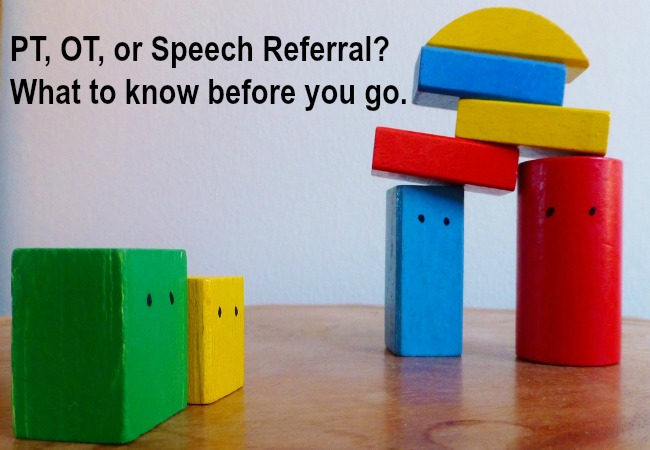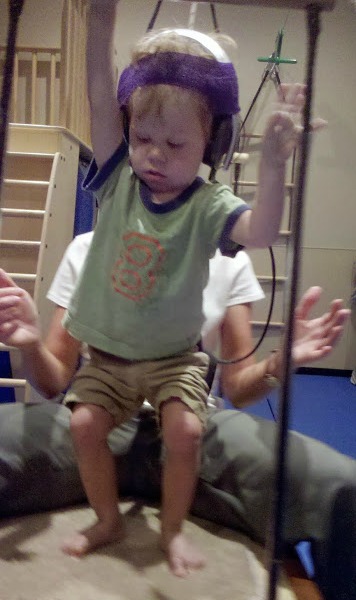My most important job is being a mother to my two beautiful boys. However, I’m also a pediatric physical therapist, which means (as my mom puts it) I get paid to play with kids all day. The setting where I work is very multidisciplinary, meaning that there are several different types of therapy working together for the best outcomes for children. Parents who bring their children in for evaluations do so by different paths, and for different reasons. Some come because their 18 month old is showing no interest in walking. Others come because their 6 year old cannot pay attention and is falling behind in school. Others because their 3 year old is not yet talking. Still others have children with a medical diagnosis or physical disability, such as cerebral palsy or Down Syndrome.
Whatever the reason they come through our doors, we consider it our privilege to partner with the children and their families to meet the goals that brought them to us.
Even though they come to us in different ways, and for different reasons, I have found over the years that parents bringing their children to therapy for the first time have many of the same questions and fears. Have you recently gotten a referral to a therapy discipline? Are you confused about what might come next? Read on for some information to calm your fears and anxieties.

First, the acrocyms….PT, OT, ST, SLP….what do all they all mean anyway?
PT = Physical Therapy or Physical Therapist
Physical therapy is a discipline many people are at least mildly familiar with. Most of us know someone who has had physical therapy for a sports injury or to rehab after a surgery. So why would a baby need physical therapy? Pediatric physical therapists help children develop the strength, range of motion, and balance to perfect motor skills such as sitting up, crawling, walking, running. Physical therapists are medical professionals who have passed a national board examination, and most have at least a Master’s degree in the field of Physical Therapy (many have a doctoral degree). The participate in ongoing continuing education to maintain their license to practice physical therapy.
OT = Occupational Therapy or Occupational Therapist
Occupational therapy is a field of medical practice that assists people in performing the activities required in daily life. These activities might include dressing, bathing, toileting, or eating. Since the work of children is play, occupational therapists who work with children concentrate on helping children develop the fine motor skills, balance, attention, coordination, and strength to be able to participate in age appropriate play tasks and self care skills. Occupational Therapists are medical professionals who have passed a national board examination and have at least a Master’s Degree. They also participate in ongoing continuing education to maintain their license.
ST = Speech Therapy; SLP = Speech and Language Pathologist
Speech therapy is about communication, which may or may not be about speech. Communication can occur by talking, signing, or using a device to assist in communicating with others. Speech therapists help children to improve their vocabulary and articulation so they can be more easily understood. They may also work with children on the attention, cognition, and social skills needed to communicate in a functional manner. Some speech therapists also help children who have difficulty swallowing. Speech and Language Pathologists are medical professionals who have completed a national board examination as well as a year of supervised practice in order to obtain their full credentials. They have at least a Master’s Degree, and must complete regular continuing education to maintain their license.

What you should know for the evaluation:
What will happen:
Your first visit to therapy will likely be different from most other medical appointments your child has attended. For one thing, it will be longer. At the clinic where I practice, physical therapy evaluations are scheduled for 1 hour, and occupational and speech therapy appointments are scheduled for 2 hours.
You can expect to take some time talking with the therapist about your specific concerns, your goals for coming to therapy, and your child’s medical history. The therapist will likely complete standardized tests and measures that will help to pinpoint where your child is having problems, or what skills he or she is missing. He or she will then use that information to develop a treatment plan to help move your child towards the goals that you have identified.
How you can help:
- Be clear in your goals and concerns. The therapist will be better able to help your child if he or she is clear about what you want out of therapy.
- Be honest. Do you feed your kid pizza for breakfast? Co-sleep? Set strict boundaries? Set no boundaries? Don’t be afraid to be real. Your therapist is not in the business of judgment, and he or she will be best able to complete a meaningful evaluation with thorough and accurate information.
- Ask questions. If you don’t understand what your therapist is recommending, or the goals they are trying to achieve, say so. It is your therapist’s job to be sure that you understand, but you can help them by speaking up if they haven’t made something clear or haven’t addressed your concerns.
- Allow yourself to say no. If your therapist suggests a therapy frequency, home program activity, or therapy intervention that you are not comfortable with or that doesn’t fit into your family life, it is okay to speak up and say so. Your therapist would much prefer to hear you say “That doesn’t work for us,” at the onset so he or she can modify things to fit what will work for you.
What you should know about treatment:
What will happen:
Most likely you and the therapist will have agreed on a treatment plan at the initial evaluation. The frequency and length of visits will vary based on your child’s age and individual needs. Whatever the goals, the therapist will do his or her best to engage your child in games and activities that will probably look more like play than work or exercise. This is by design! Children learn best when they are having fun, and you can be sure that your therapist has put a lot of time and thought into the activities that he or she selects. They are all designed to improve the areas of weakness identified in the evaluation and to move your child towards the goals that you identified together with the therapist.

How you can help:
- Be consistent. Consistent attendance as well as consistent performance of home programming is essential to progress in therapy.
- Be real. As in the evaluation, your therapist wants to know if you do not understand something, or if you are overwhelmed with any aspect of therapy. It is okay to let your therapist know if you are frustrated or need to take a step back.
- Be your child’s advocate. You know your child best. If you feel that the therapy approach isn’t working well, or that the therapist isn’t clicking well with your child, don’t be afraid to say so. Sometimes despite our best efforts, personalities just don’t mix. I know I would much rather hear that from you, than to have you become discouraged with therapy or stop attending all together. I can either modify my approach, or if necessary, transition your child’s care to one of my co-workers who could serve you better.
What you should know about discharge:
What will happen:
At some point your therapist will start to discuss discharge from therapy. It may be because your child has met all of his or her goals. It may be because you as the parent have shown that you are able to work on the skills effectively at home without the skill of the therapist involved. It may be because your child’s progress towards goals has slowed and the therapist believes further therapy is no longer beneficial. Whatever the reason, when it comes time to discharge therapy, ideally the therapist will review with you the progress that was made and any specific recommendations he or she has to help your child continue that progress outside of therapy.
How you can help:
- Ask specific questions. Have you discussed community activities? Dance lessons? Theater groups? Chances are your therapist may have some contact for these types of activities in your area and can point you towards resources that might benefit your child.
- Get your therapist’s contact information. This way if you have other questions after discharge you will be able to call or email your therapist with them more easily.
- Know that discharge doesn’t have to mean forever. If your child has a disability or medical condition, it is possible that you will be acquainted with therapists of one or more disciplines for quite some time. They become a part of your team, and in some ways, a part of your family. Thinking about discharge can be a scary thing, but rest assured that your child can always come back to therapy in the future if and when needs arise.
- Know that you can also request discharge. Therapy is important, especially for children with a special healthcare need or disability. But other things – school, family, pets, life in general – these things are also important. There is nothing wrong with deciding to take a break for awhile.
Starting therapy can be daunting for both parent and child, but rest assured that the people you will work with are professionals. We truly love children. Physical, occupation, and speech therapists who work with children have a passion to see children succeed and reach their highest potential. Trust me, when your child takes her first step, or buttons his coat alone, or puts 3 words together in a sentence, we celebrate just as genuinely as you do!
If you have concerns regarding your child’s development in any area, talk to your primary care provider about your concerns. Follow the links below for area clinics and resources.
Statewide:
Early Childhood (Formally called Early Access)
Iowa City/Coralville/North Liberty:
Center for Disabilities and Development (UIHC)
Childserve (Formally called Children’s Center for Therapy)
Enrichment Therapy and Learning Center (Speech Therapy)
Cedar Rapids:
Mercy’s Pediatric Therapy (Mercy Hospital)
Witwer Children’s Therapy Center (Unity Point Health St Luke’s Hospital)
Have you had experience with physical, occupational, or speech therapy with your child? What would you tell a parent new to the world of therapy? Share your experiences in the comments!
SaveSave











Thanks so much for these resources! We are a family in Colorado considering a move to Iowa City and our 3 yr old has gotten help from both PT and SLPs. We do love our team like part of our family and its reassuring to know where to reach out if we end up by you!
You are welcome! Good luck as you consider your move. If you do end up out this way there are a lot of great resources for families!
Every parent should read this article before going in for an evaluation! Truly great and on point. I was a peds SLP for 9 years. Don’t forget about about Child Serve (formerly Children’s Center for Therapy) in Iowa City!
Thank you Jaymie! Child Serve/Children’s Center for Therapy is such an amazing resource with so many great programs. The second link above under the Iowa City are resource list should take people to the website!
well this looks amazing, and great instructions.
I would also recommend Grant Wood AEA which is provided to families free of charge.
Yes! Grant Wood AEA (or other early intervention programs if you aren’t in the Iowa City corridor area) is a great resource for families. The Early Access program in Iowa is linked above under the “Statewide” resources.